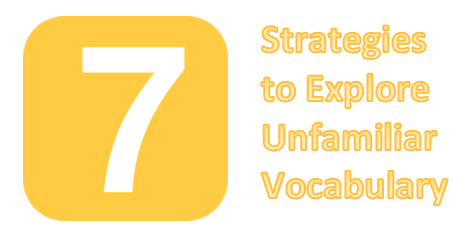A ten-year-old baby who is an efficient reader will encounter one thing like 1 million phrases a 12 months (round 12 novels), however crucially, roughly 20,000 of these phrases will show unfamiliar (Oakhill et al. 2015). It will be important then to help our pupils to develop an array of unbiased phrase studying methods to discover and to higher perceive an unfamiliar phrase they encounter.
The most typical methods for comprehending a brand new or unfamiliar phrase embody utilizing a dictionary or guessing phrase which means from the context of the sentence. Sadly, pupils usually have restricted phrase information so {that a} dictionary proves a blunt software (from understanding the spelling of an unfamiliar phrase, to deciding on the proper which means of a phrase from the choice out there). Additionally, the context of a sentence can usually show unhelpful and typically even misdirective.
We are able to help pupils by intentionally practising an array of methods for exploring an unfamiliar phrase. Over time these methods could be internalised as unbiased phrase studying expertise that pupils use mechanically.
- Phrase components (morphology). Although a phrase could show unfamiliar, pupils can usually recognise components of a phrase. Frequent prefixes and suffixes supply methods for pupils to recognise phrases and join them to their prior information. Confronted with a phrase like ‘despair’ and ‘devolve’, pupils can join the ‘de’ prefix, which means ‘down’.
- Phrase households. The widespread patterns and options supplied by phrase households are useful to recognise tough new phrases. Confronted with a posh phrase like ‘oligarchy’, pupils recognise the acquainted root ‘archy’, which means ‘rulership’. It gives a necessary hook to know the phrase, providing extra acquainted associated phrases like ‘monarchy’.
- Phrase histories (etymology). Nearly all of the advanced vocabulary of faculty has Latin & Greek origins. These phrase tales can supply very important hooks to higher understanding the which means of an unfamiliar phrase. For instance, the phrase hydrogen derives from the Greek – ‘hydro’ which means ‘water’; ‘gen’ which means ‘to convey forth’.
- Spelling (orthography). The spelling of a phrase can typically give a helpful clue as to the which means of a phrase. Pupils can determine widespread phrase households and half when exploring the spelling of a phrase. In phrases like ‘refined’ and ‘debt’, pupils recognise the unfamiliar ‘b’. The roots of the spelling are in Latin, connecting to phrase histories and phrase households.
- A number of meanings. Deep phrase information wants pupils to actively join phrases and to discover layers of which means. Most of the advanced phrases of faculty are polysemous – they’ve a number of meanings – and so pupils must discover the suitable which means of the phrase. A phrase like ‘cracking’ has a preferred which means, however in Science it’s a very particular chemical response.
- Synonyms and antonyms. Typically unfamiliar phrases are merely the extra refined labels for acquainted phrases e.g. ‘avarice’ merely means extreme greed.
- Connecting to context. Relatively than simply counting on the contextual clues simply from a sentence (which could be useful, or not), pupils could be extra conscious than sure phrases are extra prevalent in several topic domains or textual content varieties. By connecting up phrases, their households, into completely different topic domains and textual content varieties construct a deep schema of information that will increase understanding of phrase meanings and their makes use of.
Crucially, the very best technique to study new phrases is to already possess a wealth of phrases. Like psychological velcro, having a broad and deep vocabulary gives the required ‘hooks’ to higher perceive new or unfamiliar phrases. For that reason, explicitly educating vocabulary, drawing upon these seven methods, is a superb software for lecturers within the classroom.
You could find a PDF model of those 7 methods in my ‘Closing the Vocabulary Hole Sources‘ on the RESOURCE web page of my weblog.
If you’re fascinated with studying extra about vocabulary instruction and ‘closing the vocabulary hole’ within the classroom, my guide ‘Closing the Vocabulary Hole‘ is now out there right here:
Amazon – http://amzn.to/2FiwDFX Routledge – http://bit.ly/2C0vxgI

